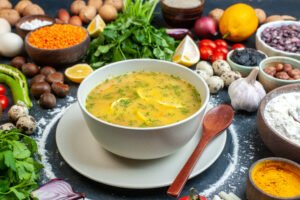
How do you stop bad gastritis habits?
Have you ever stopped to consider how your everyday habits and lifestyle choices might be impacting your digestive health?
It’s easy to overlook the subtle ways in which our actions can exacerbate conditions like gastritis, leading to discomfort and distress. But what if some of these habits are unknowingly worsening your gastritis symptoms?
The thought might provoke a sense of fear or concern, but fear not. This article aims to shed light on the habits that could be making your gastritis worse and provide guidance on how to make positive changes.
Are Your Daily Habits Making Your Gastritis Worse?
Here are ten habits to watch out for:
1. Dietary Choices
The food we consume plays a crucial role in managing gastritis symptoms. Certain foods and drinks can irritate the stomach lining, leading to increased inflammation and discomfort. Among the culprits are:
- Acidic Foods: Tomatoes, citrus fruits, and other acidic foods can increase stomach acidity, exacerbating gastritis symptoms.
- Alcohol: Alcohol can irritate the stomach lining and increase the risk of gastritis flare-ups.
- Carbonated Drinks: Beverages like soda can contribute to bloating and discomfort in individuals with gastritis.
- Coffee: The high acidity of coffee can irritate the stomach lining and worsen gastritis symptoms.
- Fatty and Fried Foods: These foods are harder to digest and can increase stomach acid production, leading to irritation.
- Spicy Foods: Spices can aggravate inflammation in the stomach lining, worsening gastritis symptoms.
2. Eating Habits
Beyond the types of foods we consume, the manner in which we eat can also impact gastritis symptoms. Consider the following habits:
- Eating Too Quickly: Rapid eating can hinder proper digestion and lead to increased stomach irritation.
- Irregular Meal Times: Skipping meals or eating at irregular intervals can disrupt the body’s digestive processes and exacerbate gastritis symptoms.
- Dining Out Frequently: Restaurant meals may contain ingredients that can trigger gastritis flare-ups.
- Consuming Leftover Food: Leftovers may harbor bacteria that can exacerbate inflammation in individuals with gastritis.
3. Drinking Habits
While staying hydrated is essential for overall health, the timing of water consumption can affect gastritis symptoms.
Drinking excessive amounts of water immediately before or after meals can dilute stomach acid, impairing the digestion process and potentially worsening gastritis symptoms.
4. Smoking
Smoking cigarettes or using other tobacco products is detrimental to gastrointestinal health.
Nicotine and other chemicals in tobacco smoke can weaken the stomach lining, making it more susceptible to inflammation and damage. Smoking cessation is crucial for managing gastritis and preventing further complications.
5. Stress
Chronic stress can take a toll on the digestive system, exacerbating gastritis symptoms. When we’re stressed, the body releases hormones like cortisol, which can increase stomach acid production and lead to heightened inflammation.
Find effective stress management techniques such as:
- Meditation: Practicing mindfulness can help reduce stress levels and alleviate gastritis symptoms.
- Yoga: Gentle stretching and breathing exercises can promote relaxation and aid in digestion.
- Deep Breathing Exercises: Taking slow, deep breaths can activate the body’s relaxation response and reduce stress levels.
6. Lack of Sleep
Poor sleep habits can negatively impact gastrointestinal health and exacerbate gastritis symptoms.

Sleep deprivation can disrupt the body’s natural healing processes, weaken the immune system, and increase susceptibility to inflammation.
Establishing a consistent sleep schedule and practicing good sleep hygiene can promote better digestive health.
7. Overuse of Pain Relievers
Nonsteroidal anti-inflammatory drugs (NSAIDs) like aspirin, ibuprofen, and naproxen are commonly used to alleviate pain and reduce inflammation.
However, frequent or prolonged use of these medications can irritate the stomach lining and exacerbate gastritis symptoms.
It’s essential to use pain relievers judiciously and under the guidance of a healthcare professional, especially for individuals with a history of gastritis or other gastrointestinal issues.
8. Skipping Meals
Skipping meals or going too long without eating can lead to fluctuations in blood sugar levels and exacerbate gastritis symptoms.
Regular meals help maintain stable blood sugar levels and prevent excessive production of stomach acid, reducing the risk of irritation and inflammation.
9. Excessive Exercise
While moderate exercise is beneficial for overall health, excessive physical activity can exacerbate gastritis symptoms.
Intense workouts can divert blood flow away from the digestive system, impairing digestion and increasing the risk of stomach irritation. It’s essential to listen to your body and avoid overexertion, especially during gastritis flare-ups.
10. Ignoring Symptoms
Ignoring or neglecting gastritis symptoms can lead to worsening of the condition and increase the risk of complications such as ulcers or bleeding.
It’s crucial to pay attention to any changes in digestive health and seek medical attention if symptoms persist or worsen.
Early intervention and appropriate treatment can help manage gastritis effectively and prevent long-term complications.
In conclusion
Adopting healthy lifestyle habits is essential for managing gastritis and reducing the risk of symptom exacerbation.
By avoiding trigger foods, practicing mindful eating habits, managing stress, and prioritizing self-care, individuals can take control of their digestive health and minimize the impact of gastritis on their daily lives.













